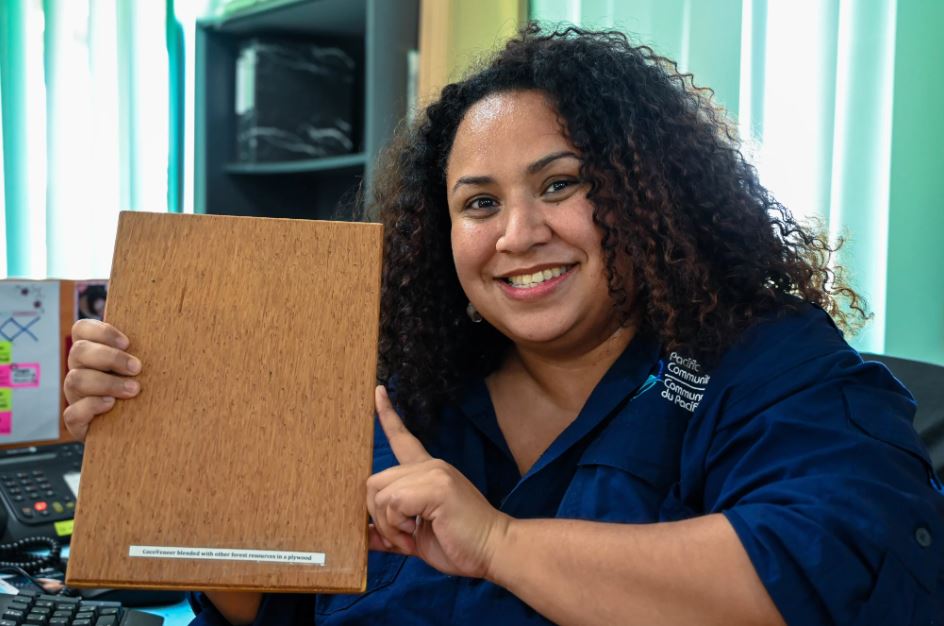Related News

The Gender and Environment course (GN402) is the Pacific’s very first course that examines gender equality and social inclusion within the context of fisheries and aquaculture and the environment. In alignment with the PEUMP Programme’s key principle, mainstreaming of human rights and gender equality through a human rights-based approach, the Gender and Environment course provides a forum for the critical examination and understanding of how gender plays out in environmental issues, with a focus on the Pacific Island countries. The course provides students with a holistic view on gender and environmental issues through an integrated approach that acknowledges the cross-cutting nature of gender concepts.
To mark this milestone, USP PEUMP reached out to several of the first cohorts that successfully registered and completed this course in Semester 1, 2022. This is Moana’s story.
USP is one of four key implementing partners of the PEUMP Programme, an initiative funded by the European Union and the Government of Sweden. The overall EUR 45 million Programme promotes sustainable management and sound ocean governance for food security and economic growth while addressing climate change resilience and conservation of marine biodiversity. It follows a comprehensive approach, integrating issues related to ocean fisheries, coastal fisheries, community development, marine conservation and capacity building under one single regional action.
Bula vinaka, my name is Moana Bergmaier-Masau. I am a mixed-race woman with a German-Spanish father and a beautiful iTaukei mother from Qoma Island, Tailevu. My academic background is a Bachelor of Science in Biology-Chemistry from the University of the South Pacific (USP), and a postgraduate certificate in Timber from the University of Tasmania (UTas).
My journey into the gender space is very interesting for me personally as it is relates to my previous and current work experiences. I was the female technician in a CocoVeneer project from 2013-2016 and loved working in the space of forestry and timber manufacturing. I remember thinking that more women could probably be interested to work in this kind of sector if they were aware of the opportunities or experiences of other women working in the timber sector. Therefore, when the Australian Centre of International Agricultural Research (ACIAR) decided to fund a third phase of the Coconut wood projects and have Gender as a component of the project, I was so excited to finally be able to explore and document women’s experiences or contributions to the forestry or timber sector.
This course has been an awesome introduction to feminist theory and gender equality for someone with a natural science background like me. Before this course, my knowledge of gender was limited to what I had read online or had been exposed to before the unit. However, I’m super thankful to have learnt so much in 13 -14 weeks of classes through zoom sessions, group discussions and through my fellow classmates on the evolution of feminist theory through the ages and how it began to incorporate masculinity or queer theory so basically from being only about women in WED (Women, Environment and Development) and Ecofeminism through to what it is known now as GESI (Gender Equity and Social Inclusion).
i. Lack of recognition of the contributions of women in fisheries/aquaculture, they are only seen in the context of gleaning
ii. Most patriarchal societies have male superiority or ownership over their natural resources thus women and other gender minorities miss out on the fundamental power/access to these resources, an example is for “Qoliqoli” rights or banning – so they have no say in how this resource is used.
iii. Gender is a social construct thus there are already gender norms or expected behaviours for certain genders that are constructed by the different societies’ traditions and cultures and thus both men and women must follow certain roles to fit into the expected norms of society. This extends to any natural use and the environment at large.
It has broadened my understanding of gender-related issues and how important it is to recognise that societal norms, culture, tradition and lifestyle development or progression have a huge role, especially in the Global South in the impacts of using natural resources.
There are so many nuances to consider when approaching a solution and so there needs to be consensus from everyone involved. People are interesting and complex so a singular solution or “one size fits all” solution will not work for every social situation that may have similar issues because of the many dynamics within that society. Plus Gender is everyone and not only women anymore.
Yes, I was always familiar with women gleaning as part of my upbringing with my mother and aunts when we went to the village. However, the fact that this isn’t recorded or documented as part of fishing in the national fishing statistics somehow gives the illusion that women do not fish or are not part of the industry.
Understanding the impacts of gender (a social construct) on the environment (a natural one) is very important because humans are complex in the way they each view life. This is important when it comes to natural resource use and management for technical organisations like the Pacific Community (SPC) to understand the social constructs already in place and how best to work with the community for the maximum benefits to both them and the environment.
Thank you to the Australian Centre for International Agricultural Research for funding my studies into the world of Gender, thank you to my project team members, especially our leaders for the space and support in undertaking this unit of study and thank you to PEUMP and USP for the wonderful course. From this course, it is my wish to recognise women’s contributions to natural resource use and management thus I will somehow document women’s contributions to Forestry, as part of my work and passion for equity in Forestry.